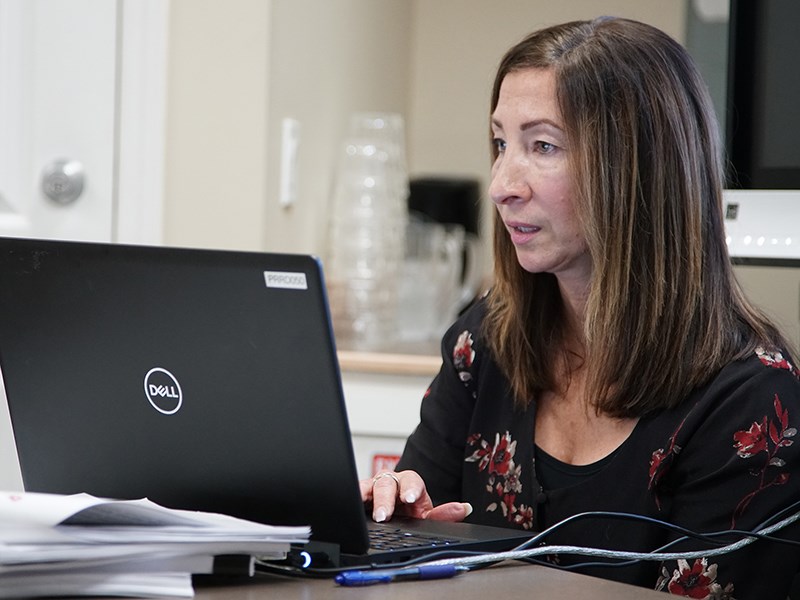qathet Regional District’s (qRD) finance committee received a second draft of the regional district’s 2022 to 2026 financial plan at a meeting on December 8.
Manager of financial services Linda Greenan outlined the draft, which highlighted financial plan assumptions, 2022 community works fund contributions and allocations, capital plan highlights, and changes in requisitions from City of Powell River and electoral districts in 2022.
Greenan said there was an adjustment from the first draft of the budget. She said there had been an original assumption of a 3.5 per cent increase in the consumer price index, but there is now a 2.3 and 2.8 per cent projection. Operational costs are projected to be two to three per cent increases on most costs, according to Greenan.
The bulk of the $13 million regional capital plan will be in waste management, with the site closure and resource-recovery centre amounting to $11.3 million in 2022/2023 and the waste transfer expenditure amounting to $4.4 million. The waste management budget will be made up of a $3.1 million grant, $11.3 million in borrowing and $715,000 from reserves.
In terms of the 2022 requisition change, in the city it is 16.92 per cent; Electoral Area A is 8.35 per cent; Savary Island is 9.21 per cent; Electoral Area B is 8.99 per cent; Electoral Area C is 9.17 per cent; Electoral Area D is 9.04 per cent; and Electoral Area E is 5.57 per cent. In terms of tax rate per $100,000 of assessed value in 2022, in the city it’s $84.68; Area A is $362.46; Savary is $211.17; Area B is $248.03; Area C is $257.55; Area D is $251.85; and Area E is $268.78.
The annual cost per average home, projecting the 2021 average home value of $374,642.03 to 2022, in the city would be $317.26; Area A would be $1,357.93; Savary Island would be $791.13; Area B would be $929.89; Area C would be $964.89; Area D would be $943.54; and Electoral Area E would be $1,006.97.
The final draft of the budget will be introduced to the finance committee on February 16, 2022, and the plan is for the regional board to consider final adoption on February 24, 2022.
Director asks about surpluses
Electoral Area D director Sandy McCormick asked about the use of surpluses, which she understands are going to reserves rather than being used to reduce the 2022 requisition.
“What would be the impact on our budget if we were to change that direction to use of surpluses to bring down the requisition needs for next year?” asked McCormick. “I’m concerned that this requisition is way too high.”
Greenan said the budgetary process is purposely trying not to use the reserves year after year.
“We’re trying to make more planned use of the reserves so we don’t have budget requisitions spike one year and drop the next,” added Greenan. “We’re trying to keep them fairly consistent.”
McCormick asked about the impact of contributing those surpluses into the operating budget for one year to try to bring the requisition down because it is “so high.”
Greenan said there might be some requisition decreases by using the surpluses but the regional district has to catch up at some point, or figure out a way to reduce cost of services in the long run.
McCormick asked if there was any way to bring down the amount all regional district residents were being asked to pay for waste management.
“That seems to be the biggest driver of the tax increase,” said McCormick. “We’ve got to come up with some way to reduce that requisition because people are going to be incredibly unhappy with that kind of an increase when it has been a difficult year for everybody.”
Greenan said the waste management plan was developed with the communities and the budget supports the waste management plan.
“It would be difficult to bring that down without going back and figuring out how we are going to change the waste management plan,” said Greenan. “We’ve increased the tipping fees to try and get funds from tipping fees and we’re also trying to reduce the amount of waste we are sending out.
“The one thing about this plan is once the resource-recovery centre is in place, we should see some lower costs. It’s difficult to manage the budget without an increase.”
Long-term debt
City director and finance committee chair George Doubt said the largest increase for the resource-recovery centre is the beginning of payment for debt. Greenan said that was correct. Doubt said there is not much that can be done about paying off the long-term debt.
Greenan said in 2022, the regional district will have its first of the debt interest payments for the centre, which amounts to $385,000.
The finance committee unanimously passed a recommendation that the regional board receive the second draft of the proposed 2022 to 2026 financial plan.
The committee also voted to recommend the board allocate $30,000 of community works funds into the general administration budget toward the projected cost to develop asset condition assessment and building replacement costs.
The committee voted to recommend the board allocate a further $25,000 of community works funds into the Lund sewer budget toward the cost of a Lund sewer wastewater master plan.



